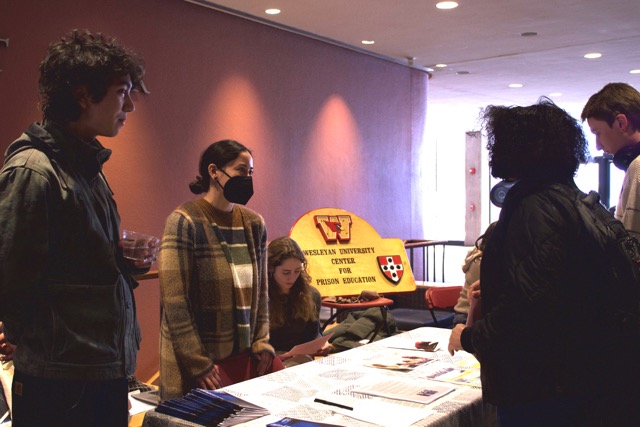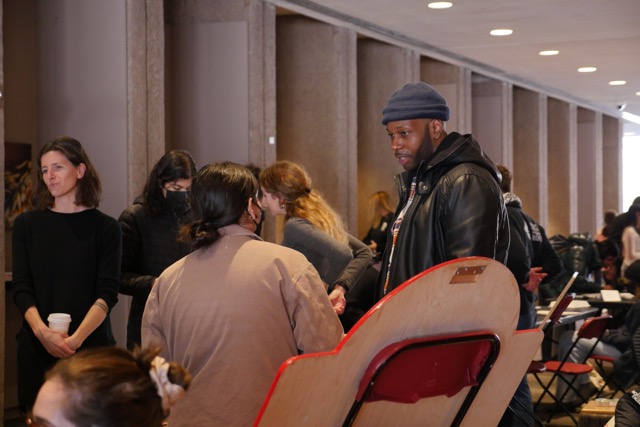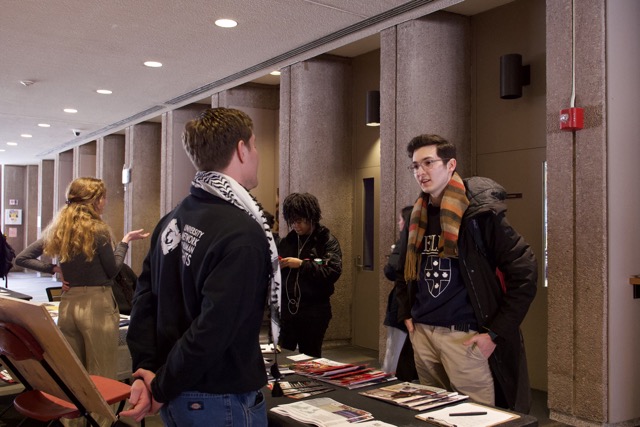
The University hosted the Democracy in Action Convening on Friday, Feb. 16 and Saturday, Feb. 17. The convention—which featured perspectives from students, faculty, and others on the connections between activism, media, and education in shaping democracy today—was a work in progress for a long time, with the University promoting it through emails, posters, and social media campaigns. Events included workshops, panels, and a dinner reception.
In the early afternoon on Friday, students took part in a media literacy workshop led by Associate Professor of Government Logan Dancey, who teaches courses on data-forward approaches to political science and polarization in America.
“It was very hands-on,” Nicole Allina ’24 said. “We actually took three different claims [that were] put on Twitter and analyzed them, which I thought was an interesting way to put ideals into practice.”
The workshop was followed by the Civic Action Fair, which showcased political and social activism on campus. Community members, students, faculty, and staff alike could be seen floating between tables staffed by student groups in the lobby of Exley Science Center. Participating organizations included the Wesleyan Center for Prison Education, Wesleyan Democratic Socialists of America, the Environmental Solidarity Network, and Cultivating Justice, which is hosting the Growing Power 2024 workshop series on Saturday, Feb. 24. Also in attendance were representatives from the Jewett Center for Community Partnerships, who promoted voter registration and facilitated the event.
Zoe Hecht ’26 explained that the fair allowed civic groups on campus to connect with one another, as well as to find potential new members and collaborators.
“I was able to talk directly to other Wes students and faculty about Cultivating Justice and the upcoming Growing Power workshop series,” Hecht said.
Michael Eric Dyson—an academic, author, and activist who has written and edited over 25 books—delivered the keynote address. His work covers topics from hip hop to civil rights, but his speech focused on the connection between higher education and democratic values.
“As bad as that is, the deep roots of anti-democracy in our nation [are] what we have to confront,” Dyson said. “How we got where we are [is an] unresolved tension…at the heart of the American project.”
The day concluded with a dinner reception in Beckham Hall, at which event attendees and speakers mingled and engaged in topical conversations.
Saturday’s session featured panels on civic education, art and activism, and media and democracy. The day started with a civic education panel moderated by Assistant Professor of Education Studies Alisha Butler.

The following civic engagement panel featured Clinical Practice Department Chair and Curriculum Designer at Relay Graduate School of Education Challa Flemming ’02; Presidential Professor for Education Policy and Politics and Co-Director of the Civic Engagement Research Group at the University of California, Riverside Joseph Kahne ’86; Chair of Urban Studies and Professor of Political Science at the City University of New York Celina Su ’99; and President of the Institute for Citizens & Scholars Rajiv Vinnakota.
The panelists stressed the importance of engagement at both the local and national levels, a topic that Vinnakota has special access to through his work at the Institute for Citizens & Scholars, an organization that promotes a network of ideologically diverse changemakers across the country.
“Once you recognize that citizen development is much more than just voting, or just being able to pass a test on the immigration or naturalization test for someone, or so forth, [one] very quickly recognizes that it is a community responsibility,” Vinnakota said.
All panelists reaffirmed the importance of civic engagement in combating threats to free speech. Flemming—who has done research in both academic and professional contexts on teaching practices, and who wrote a dissertation exploring antiracist teacher preparation—emphasized that we must understand our systems in order to change them.
“We need to understand the historical underpinnings of democracy and the ability to think critically and engage with multiple sources and make sense of [them], and there are very real forces that are trying to prevent those things from happening,” Flemming said in response to recent attacks on intellectual freedoms in higher education.
The art and activism panel featured a screening hosted by Associate Professor of Film Studies and Co-Director of the Wesleyan Documentary Project Tracy Heather Strain, who teaches courses on documentary storytelling and the history of documentary filmmaking at Wesleyan. The panel considered the relationship between visual art and student change-making.
Later in the day, the media and democracy panel brought together Associate Provost for Faculty Affairs and Professor of Political Science at Quinnipiac University Khalilah Brown-Dean, Executive Director at the Eisenhower Institute at Gettysburg Tracie Potts, and Molly Jong-Fast, host of the podcast “Fast Politics With Molly Jong-Fast.”
The panel stressed the need for local voices to be heard. According to her Quinnipiac website, Brown-Dean is a sought-after commentator whose work appears in over 400 major media outlets. She spoke from her experience on how the loss of non-national outlets has caused conversations to become stratified and depersonalized.
“That loss of local media, local journalism, really creates disincentives for people to engage, because it’s easier to be in the echo chamber,” Brown-Dean said. “It’s easier to say…the border crisis is happening far away, without thinking about the immigrant families who are right here in Middletown, who often become targeted just because of who they are, and are totally disconnected from the discourse but feel that impact.”
 The day was brought to a close with a final conversation between Anand Giridharadas, who is an author and former New York Times columnist, and Wesleyan President Michael Roth ’78. They both stressed the importance of free inquiry and productive debate within higher education.
The day was brought to a close with a final conversation between Anand Giridharadas, who is an author and former New York Times columnist, and Wesleyan President Michael Roth ’78. They both stressed the importance of free inquiry and productive debate within higher education.
“If we give up on the idea of persuasion, those people who don’t want vaccines will never want vaccines,” Giridharadas said. “That kind of civic fatalism is essentially the end of American democracy.”
Students who attended the event said that they valued the opportunity for current students and alumni to come together. The events also allowed the University to break in the newly renovated Frank Center for Public Affairs, where most of the events took place. Julia Armeli ’25 presented at the media literacy workshop and commented on the experience of participating in the Democracy in Action Convening.
“It was fun to see so many people engaged and interested at the event,” Armeli said.
Miles Craven can be reached at mcraven@wesleyan.edu.



Leave a Reply